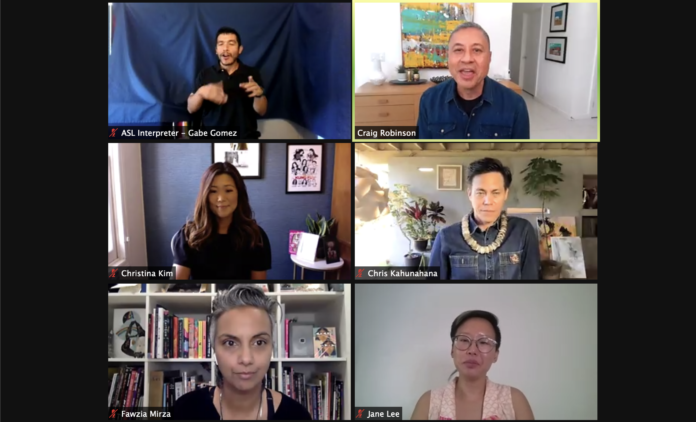By Akemi Tamanaha, AsAmNews Associate Editor
According to a new study, less than half of Asian Americans who work in the entertainment industry feel their voice is valued.
The study is titled “I Am Not a Fetish or Model Minority: Redefining What it Means to Be API in the Entertainment Industry.” It was conducted by the Geena Davis Institute on Gender in Media, who recruited AAPI survey respondents with the help of the Coalition of Asian Pacifics in Entertainment (CAPE). The research also included an analysis of 100 films.
Gold House, a non-profit dedicated to improving AAPI representation in media, hosted a virtual press conference to present the study’s findings. The press conference included a panel of AAPI members who work in the entertainment industry.
Gold House said at the press conference it believes the study is integral to improving AAPI representation in the entertainment industry.
LATEST STORIES
“We cannot move forward if we cannot measure where we are,” Bing Chen, the president of Gold House, said at the press conference.
The survey asked AAPIs about their experience working in the entertainment industry. It found that 43.5% of CAPE respondents said they felt their voice was valued. Around 89 percent of respondents also said they were the only AAPI in the room where they worked.
A majority of respondents also said they experienced microaggressions (80.9%), blatant racism (55.6%), and tokenization (72.5%) in the workplace.
The institute also asked respondents what they thought “representation” meant. The survey found that 97.6 percent of CAPE respondents felt representation meant “portraying a group of people in an authentic way on screen,” but only 42.9 percent believed that “Hollywood” would feel the same.
The study’s film analysis examined how AAPIs were portrayed on screen. It found that only 4.5 percent of leads or co-leads in the top 10 grossing domestic films from 2010-2019 were AAPI characters, despite AAPIs accounting for 7 percent of the US population. Of the AAPI characters on-screen, a third of them embodied at least one AAPI trope like, the “Martial Artist,” the “Model Minority,” or the “Exotic Woman.”
The content analysis also found that films asked the audience to laugh at 43.4 percent of AAPI characters and laugh with 23.5 percent.

Tuesday’s presentation of the study’s finding was followed by comments from actress and comedian Margaret Cho. Cho describe the importance of seeing AAPI representation in old films like Flower Drum Song and improving the quality of that representation. She also discussed the adversity she faced throughout her career.
“It was really hard but now I look back and I think, ‘What an incredible journey,'” Cho said. “I’ve seen this industry change so much and I know it has a lot more to change.
Craig Robinson, the Executive Vice President and Chief Diversity Officer for NBCUniversal, moderated the panel portion of the virtual presentation. The panelists included AAPIs writers, producers, actors and directors.
Robinson praised the panelists for creating shows that positively and accurately represent AAPIs. The NBC executive, who is Black and Asian, mentioned the sitcom Julia, starring Diahann Carroll who played a widowed nurse. According to Robinson, it was unheard of for an Black actress not to be “playing a domestic.” He said that the sitcom is remembered amongst the Black community to this day.
“That’s the power of that first representation that is positive,” he said.
Panelist and Hawaiian filmmaker Chris Kahunahuna is working to improve the portrayal of Hawaii. He described the Hollywood portrayal of Hawaii as a paradise is “damaging” and erases the experiences of Native Hawaiians.
“We take a serious responsibility to show people the reality we live in today, so it’s the true representation of our culture,” Kahunahuna said.
Actress Fawzia Mirza discussed the importance of creating roles that address the intersectional identities of AAPIs. She recalled going to several auditions and being told she wasn’t “enough” of the identity the casting directors were looking for.
“That’s when I knew, ‘Oh maybe I just need to write something,'” she said. “Even though I’ve never done this before, I need to write roles to see that intersectionality.
The panelists agreed they want to see more AAPIs in the writer’s room, in the boardroom and behind the camera. While roles in the entertainment industry for AAPIs are increasing, as the study suggests, not all AAPIs have a positive working experience in those roles.
“We see Deadline or Variety articles or posts about all of these people getting deals or movies, and I’m like, ‘Well, cool. Are they gonna get made? Is everybody being paid well? How are people on the sets when the show is made being treated?” Mirza said. “Like are the people who have been marginalized, are they being treated well when they get these jobs.”
Christina Kim, an American television writer for “Kung Fu,” and Robinson discussed the importance of providing mentorship to AAPIs writers and producers.
“You can get your foot in the door and many studios will help and pay for the writer to get that foot in,” Kim said. “But once they’re in there needs to be some mentorship to help train the next generation to become mid-level writers, to learn how to produce on set and then eventually move up to be executive producers, show runners and creators.”
The panelists say they hope the work they do will empower the younger generations.
“I often times think about: How can I help create content that affirms this next generation, this younger generation in who they are, that really affirms their identities and makes them feel empowered in their experiences?” Jane Lee, the manager of an animated Netflix original series.
AsAmNews has Asian America in its heart. We’re an all-volunteer effort of dedicated staff and interns. Check out our new Instagram account. Go to our Twitter feed and Facebook page for more content. Please consider interning, joining our staff, or submitting a story or making a contribution.








